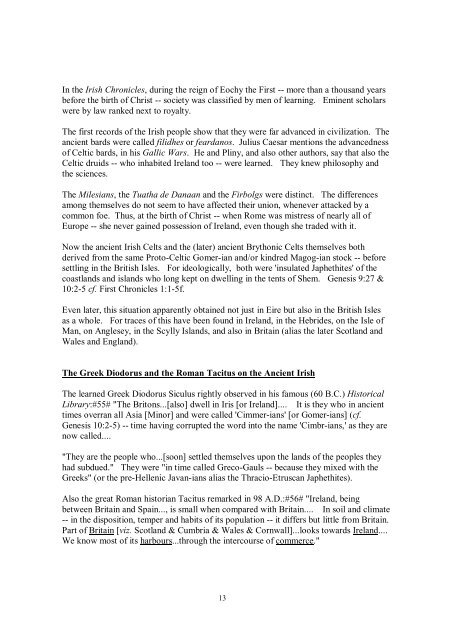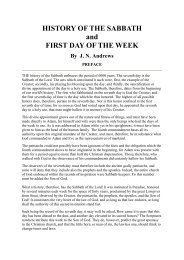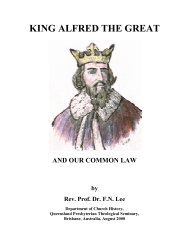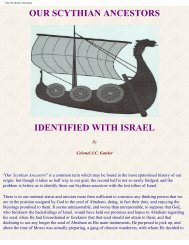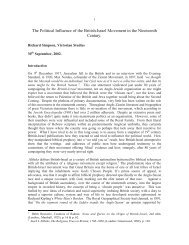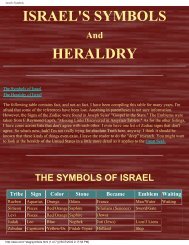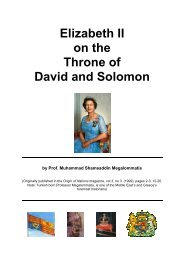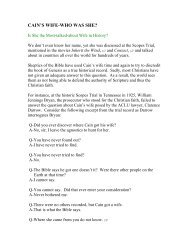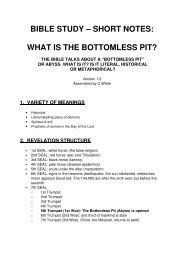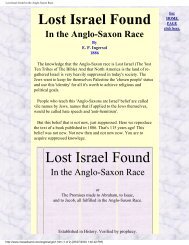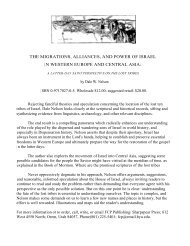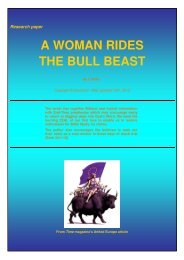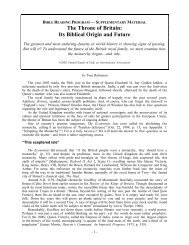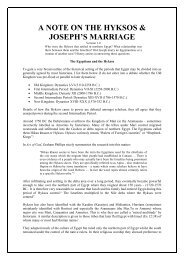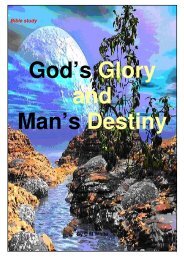CH. 6. COMMON LAW AMONG THE ANCIENT ... - Origin of Nations
CH. 6. COMMON LAW AMONG THE ANCIENT ... - Origin of Nations
CH. 6. COMMON LAW AMONG THE ANCIENT ... - Origin of Nations
You also want an ePaper? Increase the reach of your titles
YUMPU automatically turns print PDFs into web optimized ePapers that Google loves.
In the Irish Chronicles, during the reign <strong>of</strong> Eochy the First -- more than a thousand yearsbefore the birth <strong>of</strong> Christ -- society was classified by men <strong>of</strong> learning. Eminent scholarswere by law ranked next to royalty.The first records <strong>of</strong> the Irish people show that they were far advanced in civilization. Theancient bards were called filidhes or feardanos. Julius Caesar mentions the advancedness<strong>of</strong> Celtic bards, in his Gallic Wars. He and Pliny, and also other authors, say that also theCeltic druids -- who inhabited Ireland too -- were learned. They knew philosophy andthe sciences.The Milesians, the Tuatha de Danaan and the Firbolgs were distinct. The differencesamong themselves do not seem to have affected their union, whenever attacked by acommon foe. Thus, at the birth <strong>of</strong> Christ -- when Rome was mistress <strong>of</strong> nearly all <strong>of</strong>Europe -- she never gained possession <strong>of</strong> Ireland, even though she traded with it.Now the ancient Irish Celts and the (later) ancient Brythonic Celts themselves bothderived from the same Proto-Celtic Gomer-ian and/or kindred Magog-ian stock -- beforesettling in the British Isles. For ideologically, both were 'insulated Japhethites' <strong>of</strong> thecoastlands and islands who long kept on dwelling in the tents <strong>of</strong> Shem. Genesis 9:27 &10:2-5 cf. First Chronicles 1:1-5f.Even later, this situation apparently obtained not just in Eire but also in the British Islesas a whole. For traces <strong>of</strong> this have been found in Ireland, in the Hebrides, on the Isle <strong>of</strong>Man, on Anglesey, in the Scylly Islands, and also in Britain (alias the later Scotland andWales and England).The Greek Diodorus and the Roman Tacitus on the Ancient IrishThe learned Greek Diodorus Siculus rightly observed in his famous (60 B.C.) HistoricalLibrary:#55# "The Britons...[also] dwell in Iris [or Ireland].... It is they who in ancienttimes overran all Asia [Minor] and were called 'Cimmer-ians' [or Gomer-ians] (cf.Genesis 10:2-5) -- time having corrupted the word into the name 'Cimbr-ians,' as they arenow called...."They are the people who...[soon] settled themselves upon the lands <strong>of</strong> the peoples theyhad subdued." They were "in time called Greco-Gauls -- because they mixed with theGreeks" (or the pre-Hellenic Javan-ians alias the Thracio-Etruscan Japhethites).Also the great Roman historian Tacitus remarked in 98 A.D.:#56# "Ireland, beingbetween Britain and Spain..., is small when compared with Britain.... In soil and climate-- in the disposition, temper and habits <strong>of</strong> its population -- it differs but little from Britain.Part <strong>of</strong> Britain [viz. Scotland & Cumbria & Wales & Cornwall]...looks towards Ireland....We know most <strong>of</strong> its harbours...through the intercourse <strong>of</strong> commerce."13


